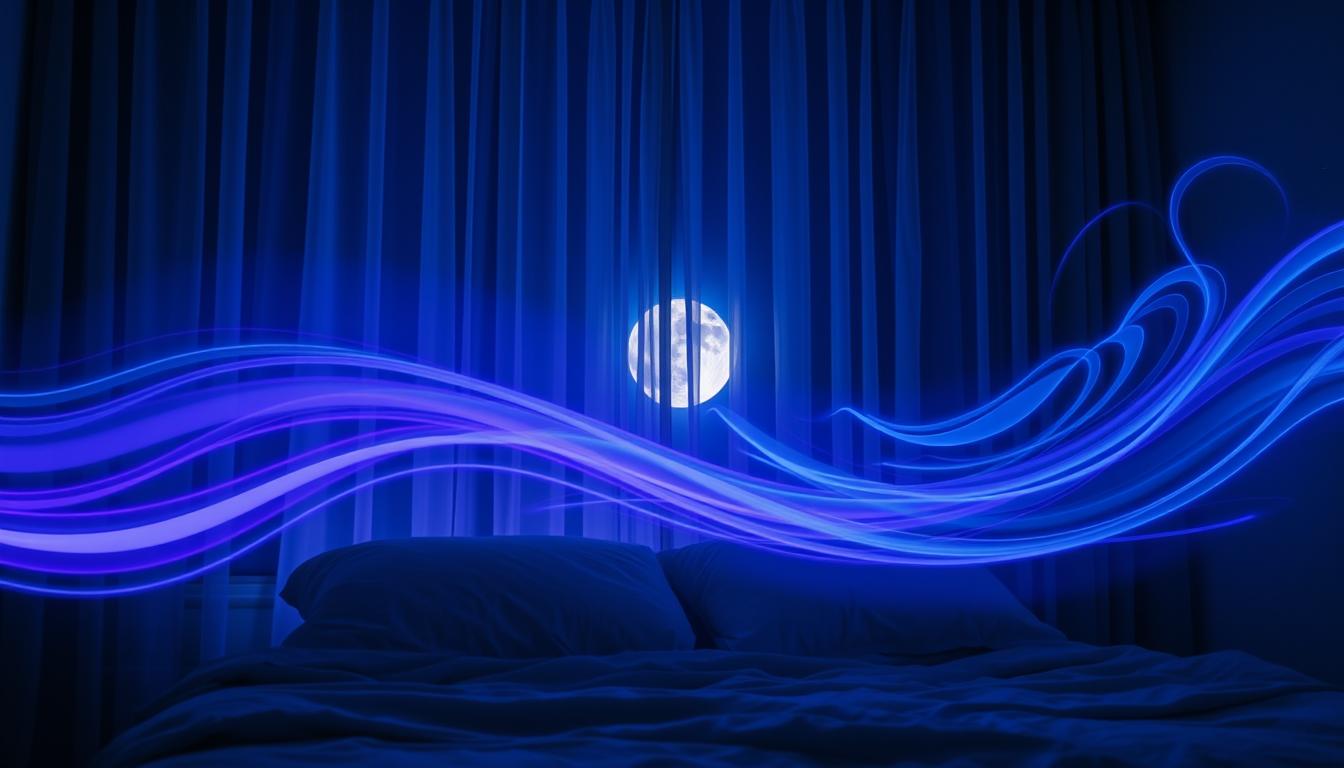“The only way to do great work is to love what you do.” – Steve Jobs
Steve Jobs’ words are especially true for personal growth. Nighttime hypnosis is a powerful tool to unlock your full potential. It works by using your subconscious mind while you sleep. This way, you can overcome big challenges, build lasting positive habits, and start a journey of deep self-discovery.
A 2018 study found that hypnosis can greatly improve sleep. It helps with insomnia, sleep terrors, nightmares, and sleep walking. With more sleep-focused hypnosis resources available, like Paul Mckenna’s YouTube audio and Michael Sealey’s tracks, it’s easier than ever to transform your life through nighttime hypnosis.
Key Takeaways
- Discover the transformative power of nighttime hypnosis for personal growth and self-improvement.
- Understand the scientific evidence supporting the benefits of sleep hypnosis on sleep quality and overall well-being.
- Explore the vast array of hypnosis resources available, from YouTube audio to Spotify tracks, aimed at enhancing sleep and relaxation.
- Unlock your full potential by harnessing the power of your subconscious mind during sleep.
- Embark on a journey of profound self-discovery and overcome long-standing challenges through the power of nighttime hypnosis.
Understanding the Power of Nighttime Hypnosis
Explore the amazing benefits of guided meditation, mindset shift, and relaxation techniques through nighttime hypnosis. This powerful practice can change your sleep and improve your overall health.
The Science Behind Sleep Hypnosis
Sleep hypnosis is backed by science. Studies show it can boost slow-wave sleep by 81% and cut awake time by 67%. It guides you into deep relaxation, like before sleep, making you more open to positive changes.
How Hypnosis Affects Brain Waves
Hypnosis changes brain waves, leading to deep relaxation and openness. In this state, you’re more ready to accept positive thoughts and images. This helps make lasting changes in your subconscious.
Benefits of Nighttime Programming
- Improved sleep quality and duration
- Reduced stress and anxiety
- Enhanced mood and emotional well-being
- Increased focus and cognitive function
- Accelerated personal growth and transformation
Nighttime hypnosis opens doors to new possibilities. It’s a journey of self-discovery, healing, and empowerment. Start this journey and find a more restful, fulfilling life.

Why Traditional Sleep Methods May Not Be Working for You
Are you tired of tossing and turning every night? Struggling to find a good night’s sleep? You’re not alone. Insomnia and sleep deprivation affect millions of Americans. Traditional sleep medications might help, but they can make you feel drowsy and unfocused.
Studies reveal that 18% of American adults over 18 use sleep medications. Long-term insomnia or broken sleep can cause stress, weight gain, depression, high blood pressure, and even organ disease. It’s time to look for a healthier, more natural solution. Hypnosis is a great alternative.
“Hypnosis offers a drug-free, non-addictive solution to sleep issues, without the drawbacks of conventional sleep aids.”
Hypnosis works differently than sleeping pills. It accesses your subconscious mind to help you relax deeply and sleep better. By tackling the real reasons behind your sleep problems, hypnosis can help you overcome sleep deprivation and get the restful nights you need.

If you’re fed up with sleep medication and its side effects, it’s time to try nighttime hypnosis. Get ready to wake up feeling refreshed, focused, and ready to tackle the day.
The Two Core Components of Effective Sleep Hypnosis
Discover the secrets of nighttime hypnosis by learning about its two key parts: the induction phase and the therapeutic suggestions. These elements work together to lead your mind into a deep, calming hypnotic state. They also prepare your subconscious mind for better sleep and health.
Induction Phase Explained
The induction phase aims to take you into a trance-like state, like the calm of guided meditation. Here, your mind enters the “theta brainwave state,” where you’re in control but feel very relaxed. You’re ready to accept positive suggestions.
Research shows this hypnotic induction can boost slow-wave sleep by up to 81%. It also cuts time spent awake by 67%.
Therapeutic Suggestions and Their Impact
The suggestion phase is where the real magic happens. Once you’re in the right hypnotic state, you’ll hear therapeutic suggestions that can change your sleep and well-being. Studies prove these suggestions can greatly improve slow-wave activity and deep sleep.
“Consistency in hypnosis sessions can lead to a distinct improvement in sleep quality. Many individuals have reported significant improvements in sleep quality through hypnosis.”
By combining the induction and suggestion phases, you tap into the full power of nighttime hypnosis. It reshapes your subconscious mind and helps you develop healthier sleep habits. These changes can greatly improve your life.
Transform Your Life with Nighttime Hypnosis: A Complete Guide
If you’re having trouble sleeping, you’re not alone. A huge 14.5% of adults struggle to fall asleep at night. But, there’s a powerful solution: nighttime hypnosis.
Nighttime hypnosis is a unique way to improve your sleep and well-being. You can try self-hypnosis or personalized hypnotherapy sessions. Both offer amazing benefits.
Self-Hypnosis for Sleep
Self-hypnosis is a powerful tool for better sleep. It uses visualization, relaxation, and positive affirmations. This helps your mind relax deeply and overcome sleep issues.
Hypnosis Recordings for Sleep
Hypnosis recordings, like those on the Grace Hypnosis app, are a great option. These audio tracks guide you into deep relaxation. They help you experience hypnosis’s benefits at your own pace.
Private Hypnotherapy Sessions
Private hypnotherapy sessions offer a personalized approach. A qualified practitioner tailors the experience to your needs. This helps you overcome mental barriers and improve your sleep.
Choosing nighttime hypnosis is a natural way to improve your sleep and life. Start your journey towards better rest and a more fulfilling tomorrow.
“Hypnotherapy increased ‘slow wave sleep’ by 81% and reduced time spent awake by 67%.”
Creating the Perfect Environment for Nighttime Hypnosis
Start your journey to better sleep with hypnosis by setting up the right sleep space. A good sleep environment and a consistent bedtime routine can make hypnosis more effective.
Setting Up Your Sleep Space
A calm, quiet, and dark room is key for hypnosis at night. Make sure your bedroom has no distractions like bright lights or loud noises. Choose comfy bedding and keep the room cool.
Dim the lights and use blackout curtains or an eye mask to block out light.
Establishing a Pre-Sleep Routine
- Try relaxation techniques like deep breathing, progressive muscle relaxation, or gentle stretching to relax your mind and body.
- Do soothing visualization exercises to imagine a peaceful scene, helping you fall asleep.
- Repeat positive hypno-affirmations to yourself, like statements about getting good sleep.
Having a regular bedtime routine and a good sleep space is essential for hypnosis. Focus on your bedtime routine, sleep environment, and relaxation techniques for a better night’s sleep.
Breaking Through Mental Barriers During Sleep
Getting a good night’s sleep can be tough when our minds are full of worries. Nighttime hypnosis helps overcome obstacles and reprogram the subconscious for a better mindset shift. It tackles the root causes of sleep problems, leading to personal growth.
Nighttime hypnosis creates a calm space for your mind to relax. It uses techniques like imagining a peaceful place or putting worries in a box. This helps quiet the mind and improves sleep quality.
By using hypnosis, you can break through mental barriers and reprogram limiting beliefs. It helps overcome fears, anxieties, and builds a positive self-image. Nighttime hypnosis empowers you to change your mindset and behaviors for lasting change.
“Hypnosis unlocks our subconscious, revealing the causes of our struggles and giving us tools to overcome them. With practice and dedication, it can help us get the restful sleep we need.”
Start using nighttime hypnosis to overcome obstacles, subconscious reprogramming, and a mindset shift. It will unlock new personal growth and well-being.
| Technique | Description | Benefits |
|---|---|---|
| Visualizing a Safe Space | Imagine a calm and comforting place, like a serene beach or a cozy cabin, to relax your mind. | Reduces anxiety, makes you feel safe, and helps you forget worries. |
| Putting Worries in a Box | Imagine putting your concerns into an imaginary box, then sealing it to let go of thoughts during sleep. | Helps manage intrusive thoughts, leading to better sleep. |
| Affirmation Repetition | Repeat positive affirmations, like “I am safe and secure,” during hypnosis to boost confidence. | Changes how you see yourself, boosts confidence, and replaces negative thoughts with positive ones. |
Reprogramming Your Subconscious for Success
Unlocking your subconscious mind is key to self-improvement, positive thinking, and personal growth. By changing your limiting beliefs, you can make your subconscious work for you. This opens the door to a more fulfilling and successful life.
Identifying Limiting Beliefs
The first step is to find the negative beliefs holding you back. These beliefs are often hidden in your subconscious. They come from your past and society. Think about the thoughts that stop you, like “I’m not good enough” or “I can’t achieve my goals”.
With awareness and effort, you can challenge and change these beliefs.
Installing Positive Affirmations
After finding your limiting beliefs, replace them with positive affirmations. These statements can change your subconscious mind. They help you think positively and grow personally. Say your affirmations every day, especially before bed.
Imagine yourself achieving your goals. Let these positive thoughts become part of your subconscious.
“The mind is everything. What you think, you become.” – Buddha
With regular practice and commitment, you can change your subconscious beliefs. This unlocks your full potential for positive thinking and success.
Combining Hypnosis with Other Relaxation Techniques
Unlocking the full potential of nighttime hypnosis often involves combining it with other proven relaxation techniques. By integrating meditation, deep breathing exercises, and progressive muscle relaxation into your pre-sleep routine, you can create a powerful synergy. This synergy enhances the effectiveness of your hypnotherapy journey.
Meditation, with its ability to calm the mind and induce a state of deep relaxation, pairs exceptionally well with hypnosis. Research shows that meditation can significantly improve sleep quality. This makes it an invaluable tool in your quest for better rest and rejuvenation.
Incorporating deep breathing exercises into your nighttime hypnosis routine can also work wonders. Studies have found that deep breathing can help reduce insomnia symptoms and promote a more restful slumber. By consciously regulating your breath, you can seamlessly transition into a hypnotic state. This primes your mind for the transformative suggestions to come.
Another complementary technique is progressive muscle relaxation (PMR). This practice, which involves systematically tensing and releasing muscle groups, has been shown to help alleviate stress and improve sleep quality. When combined with hypnosis, PMR can deepen your state of relaxation. This allows your subconscious mind to become more receptive to the positive changes you wish to instill.
| Relaxation Technique | Key Benefits | Research Findings |
|---|---|---|
| Meditation | Calms the mind, induces deep relaxation | Significantly improves sleep quality |
| Deep Breathing | Reduces insomnia symptoms, promotes restful sleep | Helps alleviate insomnia and improve sleep |
| Progressive Muscle Relaxation (PMR) | Alleviates stress, enhances relaxation | Improves sleep quality and duration |
By seamlessly weaving these complementary techniques into your nighttime hypnosis practice, you can unlock a transformative synergy. This synergy amplifies the power of your subconscious mind. Embrace the journey, and let the harmonious blend of hypnosis and relaxation techniques guide you to the restful, rejuvenating sleep you deserve.
Measuring Your Progress and Tracking Transformations
Starting a journey of personal growth and better sleep with nighttime hypnosis needs careful tracking. By watching key signs, you learn how well it works and how to make it better.
Sleep Quality Indicators
One main goal of nighttime hypnosis is to improve your sleep. To see how you’re doing, look at these signs:
- Time it takes to fall asleep: See how long it takes to sleep well, showing better relaxation and sleep start.
- Number of nighttime awakenings: Keep track of any sleep breaks, as fewer mean better, deeper sleep.
- Feeling refreshed upon waking: Note how awake and fresh you feel in the morning, showing hypnosis works.
Behavioral Changes to Watch For
Not just sleep, nighttime hypnosis can also change how you act and think. Look for these positive changes in your life:
- Improved mood: See if you feel happier, showing your subconscious is changing.
- Increased energy levels: Watch your energy all day, as better sleep means more energy.
- Enhanced cognitive function: Notice better focus, memory, and decision-making, showing hypnosis’s deep impact.
Tracking these signs helps you see how powerful nighttime hypnosis is. It lets you adjust your practice for the best results.
| Sleep Quality Indicators | Baseline | Week 4 | Week 8 |
|---|---|---|---|
| Time to Fall Asleep (minutes) | 30 | 25 | 20 |
| Nighttime Awakenings (per night) | 3 | 2 | 1 |
| Feeling Refreshed Upon Waking (1-10 scale) | 6 | 8 | 9 |
“Tracking my progress has been key to unlocking the true potential of nighttime hypnosis. The improvements in my sleep quality and overall well-being have been truly transformative.”
Common Challenges and How to Overcome Them
Starting your nighttime hypnosis journey can change your life, but it comes with challenges. You might find it hard to relax or have racing thoughts. But, with the right mindset and strategies, you can beat these obstacles and enjoy the benefits of sleep hypnosis.
Sleep anxiety is a common challenge. If you worry about the process or falling asleep, it’s key to tackle the root cause. Try relaxation techniques like deep breathing and progressive muscle relaxation to calm down. Also, working with a skilled hypnotherapist can help with persistent insomnia or anxiety.
Adapting to hypnosis can also be tough. Remember, everyone is different, and it might take time to get used to it. Keep practicing, and it will get easier. Don’t worry if you don’t see results right away. Just be patient and trust the process.
Some people doubt hypnosis’s effectiveness. If you’re skeptical, learn about the science behind sleep hypnosis. Knowing the facts can help you believe in its power.
Remember, facing challenges is all part of the journey. Be kind to yourself, stay dedicated, and trust in nighttime hypnosis. With a positive mindset, you can unlock its full potential and see life-changing results.
| Challenge | Recommended Strategies |
|---|---|
| Sleep Anxiety |
|
| Adapting to Hypnosis |
|
| Skepticism about Hypnosis |
|
“Consistency is key – the more you practice, the easier it will become. Don’t get discouraged if you don’t feel immediate results; trust the process and be patient with yourself.”
Conclusion
Nighttime hypnosis is a powerful tool for transforming your life. It improves sleep quality and changes your subconscious mind. The techniques in this guide can help you sleep better, feel less anxiety, and grow personally.
Changing for the better takes time and effort. By sticking with nighttime hypnosis, you can see big improvements in sleep and health. Studies show hypnosis works well for many issues, like pain and changing behaviors.
Start your journey of sleep improvement and self-discovery with patience. Trust your subconscious to lead you to better sleep. Nighttime hypnosis can make your life healthier and more balanced.
FAQ
What is nighttime hypnosis and how can it transform my life?
Nighttime hypnosis is a method to change your life while you sleep. It reaches your subconscious mind. This can help you deal with issues like confidence and anxiety.
How does sleep hypnosis work?
Sleep hypnosis guides you into a deep, relaxed state. It’s like the trance before you fall asleep. This lets in positive suggestions for better sleep and well-being.
What are the benefits of nighttime hypnosis compared to traditional sleep methods?
Traditional sleep methods can make you feel drowsy and unfocused. Hypnosis is a natural, healthy choice. It helps you sleep better without the side effects of drugs.
What are the key components of effective sleep hypnosis?
Good sleep hypnosis has two parts: induction and suggestions. The induction phase gets you into a trance. The suggestion phase gives you positive prompts for better sleep.
What are the different ways to experience hypnotherapy for sleep?
You can try hypnotherapy for sleep in several ways. Self-hypnosis, hypnosis recordings, and private sessions are all options. Each offers a different way to enjoy the benefits of nighttime hypnosis.
How can I create the perfect environment for nighttime hypnosis?
For the best nighttime hypnosis, make your sleep space comfy. Also, have a consistent pre-sleep routine. This could include relaxation, visualization, and hypno-affirmations to get ready for sleep.
How can nighttime hypnosis help me break through mental barriers and sleep better?
Nighttime hypnosis can tackle subconscious fears and anxieties. It makes you feel safe and secure. Techniques like visualizing a safe space can help you sleep better.
How can I reprogram my subconscious mind for better sleep and personal growth?
To reprogram your subconscious, identify and change negative beliefs. Replace them with positive affirmations. This can help you sleep better and improve your overall well-being.
How can I combine hypnosis with other relaxation techniques?
You can mix hypnotherapy with meditation, deep breathing, and muscle relaxation. This mix can boost your sleep quality and well-being.
How can I track my progress and measure the transformations from nighttime hypnosis?
It’s important to track your progress with nighttime hypnosis. Look at how long it takes to fall asleep and how refreshed you feel. Also, watch for mood and energy improvements.
What are some common challenges in nighttime hypnosis and how can I overcome them?
Challenges like trouble relaxing and racing thoughts are common. Overcoming them takes patience and practice. Hypnotherapy can also help with anxiety and stress, making sleep hypnosis more effective.




























































